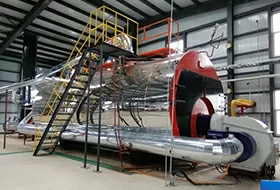
Sep . 23, 2024 17:33 Back to list
Efficient Biomass Hot Water Boiler Solutions for Sustainable Heating Systems
The Benefits of Biomass Hot Water Boilers
In recent years, the shift towards sustainable energy solutions has become a focal point for both residential and commercial sectors. Among various renewable energy technologies, biomass hot water boilers represent an innovative and effective approach to meet heating needs while reducing carbon footprints. These systems harness organic materials, such as wood pellets, agricultural residues, and waste, to produce hot water for a multitude of applications.
One of the primary advantages of biomass hot water boilers is their environmental benefits. Unlike traditional fossil fuel-based boilers, biomass systems utilize renewable resources that can lead to a significant reduction in greenhouse gas emissions. By using crops and residues that absorb carbon dioxide during their growth, biomass boilers can operate in a closed carbon cycle, thereby minimizing overall carbon emissions and promoting a cleaner environment.
Moreover, biomass hot water boilers are often more efficient than their conventional counterparts. They are designed to extract maximum energy from biomass fuels, ensuring that more heat is generated with less fuel. This high efficiency can result in lower operational costs for users, as the need to purchase and manage fuel is streamlined. Additionally, many modern biomass boilers are equipped with advanced technology, including automated fuel feeding systems and emissions control mechanisms, which enhance their performance and lower maintenance requirements.
biomass hot water boiler

Another significant benefit of biomass hot water boilers is their versatility in application. These systems can be used for a variety of purposes, such as heating residential homes, providing energy for commercial buildings, and supplying hot water for industrial processes. This versatility allows for widespread adoption across different sectors, promoting the utilization of renewable energy in various forms.
Furthermore, the use of biomass supports local economies. Often, biomass fuel sources are sourced locally, which can stimulate local agricultural sectors and create jobs. By investing in biomass infrastructure, communities can reduce their reliance on imported fossil fuels, leading to increased energy security and economic resilience.
Despite these advantages, it is important to consider some challenges associated with biomass hot water boilers. Sourcing and managing biomass fuel can require a certain level of infrastructure and logistics that may not be readily available in all areas. Additionally, the combustion of biomass can produce particulate emissions if not properly managed, necessitating robust emissions control technologies.
In conclusion, biomass hot water boilers present a promising alternative to conventional heating systems. By leveraging renewable resources, these systems offer an array of benefits including reduced greenhouse gas emissions, increased efficiency, and local economic support. While they do pose certain challenges, the ongoing advancements in technology and increasing societal awareness of renewable energy solutions ensure that biomass systems will play a vital role in the transition towards more sustainable heating practices in the future. Embracing such innovations could significantly contribute to mitigating climate change and fostering a greener planet.
-
High-Efficiency Commercial Oil Fired Steam Boiler for Industry
NewsJul.30,2025
-
High-Efficiency Biomass Fired Thermal Oil Boiler Solutions
NewsJul.30,2025
-
High Efficiency Gas Fired Thermal Oil Boiler for Industrial Heating
NewsJul.29,2025
-
High-Efficiency Gas Fired Hot Water Boiler for Sale – Reliable & Affordable
NewsJul.29,2025
-
High Efficiency Biomass Fired Hot Water Boiler for Industrial and Commercial Use
NewsJul.29,2025
-
High-Efficiency Biomass Fired Hot Water Boiler for Industrial Use
NewsJul.28,2025
Related PRODUCTS






















